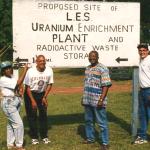This Week in People’s History, Apr 30–May 6

A Win for Environmental Justice
27 YEARS AGO, on April 30, 1997, after a years-long grassroots organizing campaign by Citizens Against Nuclear Trash, the U.S. Nuclear Regulatory Commission made the unprecedented decision to come down on the side of environmental justice. The commission denied a Louisiana Energy Services application for a permit to build an uranium enrichment plant in the middle of an African-American community in Claiborne Parish. https://www.nirs.org/juneteenth-honoring-a-landmark-environmental-justi…;
A Loss for School Integration
65 YEARS AGO, on May 1, 1959, the racist movement in opposition to the integration of public schools flexed its muscles in Prince Edward County, Virginia, by eliminating all public education in the county rather than comply with the legal requirement that the county’s schools integrate. Prince Edward County was not the only jurisdiction that did so, but it had the distinction of shutting down its schools for the longest period of time, five years. In the fall of 1959, a private school, which was supported in part by tuition vouchers from the state government, opened for the country’s 1400 white students, but the county’s two thousand African-American students had only intermittent access to schools in the county for five years. https://en.wikipedia.org/wiki/Davis_v._County_School_Board_of_Prince_Ed…;
Slap on the Wrist for Torturers
20 YEARS AGO, on May 2, 2004, a secret 53-page U.S. Army “Report of Abuse of Prisoners in Iraq,” was leaked to the press. It was the first official confirmation that the Army had been routinely torturing Iraqi prisoners, as had first been charged by Amnesty International nine months earlier. The official report found and described “numerous incidents of sadistic, blatant, and wanton criminal abuses were inflicted on several detainees . . . systemic and illegal abuse.” The investigation resulted in fewer than 20 enlisted men and women being subjected to courts-martial or lesser forms of discipline, but no official repercussions for any commanders, despite the eventual disclosure of ample evidence that high military and civilian officials had facilitated the abuse. https://www.newyorker.com/magazine/2007/06/25/the-generals-report
Pete Seeger’s Birthday
105 YEARS AGO, on May 3, 1919, progressive troubadour and activist Pete Seeger was born in Manhattan, New York. Visit the Zinn Education Project for an excellent short introduction to his life and work at https://www.zinnedproject.org/news/tdih/pete-seeger-born/
No Place to Be Somebody Opens
55 YEARS AGO, on May 4, 1969, Charles Gardone’s drama, No Place to Be Somebody, opened at the Public Theater. Not only did it immediately become a critical and box-office success, it gained the status of two first-ever prize-winning achievements when it was awarded the Pulitzer Prize for drama, making Gardone the first African-American to win the Pulitzer for Drama and making it the first time the drama Pulitzer went to an off-Broadway production. https://en.wikipedia.org/wiki/No_Place_to_Be_Somebody
National Conference on Lynching
105 YEARS AGO, on May 5, 1919, the first-ever National Conference on Lynching, organized by the NAACP, which was attended by some 2500 people, opened for two days in Manhattan’s Carnegie Hall. One of the goals of the conference was to pressure Congress to pass a bill to make lynching a federal crime. The bill passed the House but was defeated by a Senate filibuster. Similar bills went down to similar defeats for more than a century, until a federal anti-lynching bill was finally signed into law in April 2022. To view Thirty Years of Lynching in the United States, 1889-1918, a booklet published by the NAACP for the conference, click here: https://archive.org/details/thirtyyearsoflyn00nati/page/n2/mode/1up
‘We Don’t Want to Radiate!’
45 YEARS AGO, on May 6, 1979, at least 100,000 protesters marched through Washington, D.C., to demand an end to the construction of new nuclear power plants in the U.S, chanting “Two, four, six, eight, we don’t want to radiate!” The demonstration was by far the largest of three that had taken place in that year, beginning with Seabrook, New Hampshire, in 1978 and San Francisco, California, in April 1979. Turnout for the Washington demonstration had been encouraged by the potentially catastrophic meltdown of a nuclear reactor near Harrisburg, Pennsylvania, just five weeks earlier. http://www.freepress.org/columns/display/7/2008/1627
